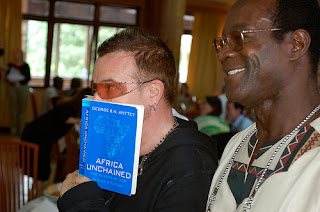Nubian Cheetah and AIDG’s Haiti Project
 A quick roundup before the weekend.
A quick roundup before the weekend.
First, here’s a new blog to check out: Nubian Cheetah.? Its author, Nii Simmonds, is based here in DC (small world) and was recently a speaker at TED Africa.? Nii posted last week about a conversation he had with George Ayittey (also based here in DC, at American University) regarding a “Cheetah Sustainable Fund.”?This comes on the heels of Ayittey’s construction of Hippos vs. Cheetahs to describe old-school, development money dependent African government bureaucrats (Hippos) vs. new-school, entrepreneurial African business and political leaders (Cheetahs).? See my previous post for details.
In any case, Nii and George brainstormed a Cheetah Fund:
During our 30 minute conversation about the TED conference, George asked, “so Nii how do we get you TED Cheetah’s to contribute to African development”? I thought about it for a second and said, “I would be nice if TED sponsored fellows to their respective countries to use their professional work experience to help a business for a month or so. I heard a pause, and George said, “well that is nice, but what about a fund, called a Cheetah Fund that is sustainable was set-up to help TED fellows or other African Cheetahs with funding for their respective businesses.”
Read the whole post, and consider adding Nii’s blog to your RSS feeds.? I know I did.
Also of note, AIDG has launched a small business to bring sanitation services to Cap Hatien, Haiti’s second-biggest city.? Check out the press release for details:
Over 60% of Cap-Haitien’s inhabitants do not have adequate sanitation in their homes. The public latrines that do exist are rarely maintained because of a lack of funds. With no other options, many residents resort to defecating in the open, often in nearby bodies of water, or in plastic bags. Feces in plastic bags has earned the facetious name of ?flying toilets?, as they are often hurled onto solid waste piles or roofs.
AIDG’s aim is to create a small business that will alleviate part of this problem by maintaining the public latrines. Typically, latrines in Cap-Haitien are emptied by hand with shovels. It is slow, unpleasant, and dangerous work; the danger comes from the absence of suitable protective clothing or equipment. When finished, the waste is not properly disposed of and is usually dumped in local mangrove swamps, increasing the contamination of local water sources.
The development of a low-cost pumping solution would increase the speed and safety of latrine cleaning. Adaptation of AIDG’s biodigester technology could also allow for the safe processing of human waste to kill harmful pathogens.
Happy weekend, and here’s hoping you don’t encounter any ’flying toilets’!!
- Categories
- Uncategorized
